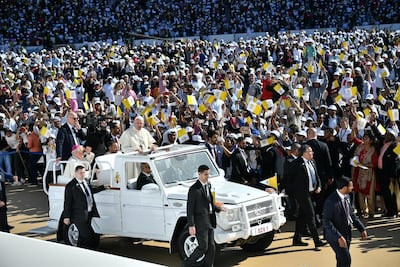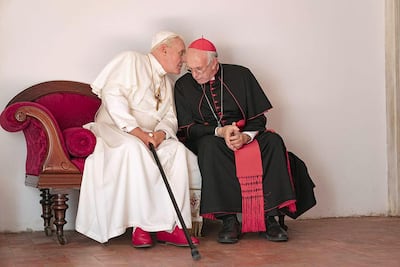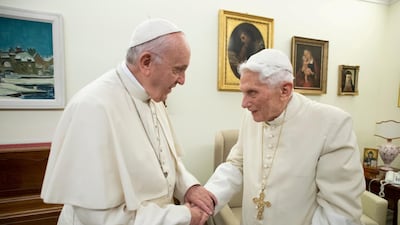The Oscar-nominated film The Two Popes, which puts a spotlight on the historical anomaly of a pair of living pontiffs in Vatican City, has been a great hit for Netflix. Meticulous in detail, the film's producers built a replica of the magnificent and ornate Sistine Chapel, the official residence of the pope, after Vatican authorities refused access to film inside its walls.
But the attention to detail extends beyond the sets. The movie brilliantly recreates the momentous decision made by Pope Benedict XVI to abdicate in 2013 before eventually being succeeded by the comparatively more liberal Pope Francis. Benedict's move is depicted as a recognition that the church needed to shift itself to a path to openness. The fictional Benedict, played by Anthony Hopkins, is shown as a statesman resolved to accept this harsh reality – even if he has no taste for what must happen. As the Netflix drama makes clear, Pope Francis, whose character is portrayed by Jonathan Pryce, brings a very different perspective to the papacy.
The Argentine priest witnessed political turmoil in his home nation during the 1970s and 80s, and he saw that the powerful church could not rely on dogma alone to hold itself immune from the chaos enveloping his people. That experience has informed his leadership of Catholics and he has remained an outsider who defines himself in distinction to the powerful bureaucracy that governs his institution. As a result, the Curia, which is the central body through which the affairs of the church are conducted, has been horrified by the ideas set in motion by him.

Roman Catholics believe that in matters of belief, the pope provides infallible leadership. While much can be debated about the institution itself, the authority of the papacy remains absolute. That is why the existence of two popes creates such a frisson.
Benedict, who was bestowed the title of Pope Emeritus after his abdication, has largely lived in seclusion in a monastery in the Vatican for seven years while his successor provides the public face of the church. The first pope to resign since 1415 had, after all, pledged to remain “hidden from the world” in retirement.
Pope Francis, in contrast, has been a campaigning figure.
During the refugee crisis facing Europe from 2015, he stood strong for the desperate millions that sought to flee ISIS in Syria and Iraq. He invited a Syrian family to live in the Vatican and visited the frontline reception centres sheltering newcomers. He did not lend the church's prestige to nativist movements in Europe that sought to exploit the numbers fleeing. Just a year ago with his trip to the UAE, he arrived with a message of tolerance and bridge-building that found a ready audience in Abu Dhabi.
Pope Francis has also sought to reverse some of his predecessor’s more conservative reforms. It is clear, for instance, that one of his objectives is for women to play a bigger role in the church. And the powerful factions that were entrenched during Benedict’s rule have sought to slow down or stall many of his ideas.

Until the distribution of the Netflix drama, Benedict was missing from the fray. He made a brief appearance on stage to celebrate his 90th birthday in 2017. Much of the slow-moving fight for control of the direction of the church was taking place far behind the scenes. But life suddenly began to imitate art at the start of 2020.
First, the pope emeritus invited a Bavarian television channel to report on his routine in retirement. Like the Netflix movie postulated, he was shown enjoying traditional German cooking in his monastery rooms. Then a book, From the Depths of Our Hearts, was published. Reportedly jointly authored by Benedict, it directly took on the views of his successor. The old pope put his foot down over moves to abolish celibacy rules for clergy in the Amazon regions of South America and greater participation by women in church affairs. Some reports included a comment from Benedict that he "could not keep silent" in the face of divisions in the church.
The church, meanwhile, has tried to quell reports of discord and suggested that the book takes advantage of the increasingly frail Benedict. If true, however, the concurrent opinions held by the two men represent a grave challenge to an institution that showcases itself as united as well as universal. It also undercuts the Netflix idea that Benedict had moved with some grace to acknowledge that his personal inclinations were no longer fit for the times.
But it is important to note that, while he is ailing and increasingly at rest during the day, Benedict continues to be relevant because he is still alive. The conservative heavyweights in the church draw strength from a bipolar situation to resist the current incumbent. And once opened, these wounds can easily become deeper.
The wider issue is that Pope Francis is a revolutionary at the heart of Rome. But what is in question is the long-term legacy of the "two popes era". And this suggests the feud will long outlast both men.
Damien McElroy is the London bureau chief of The National


